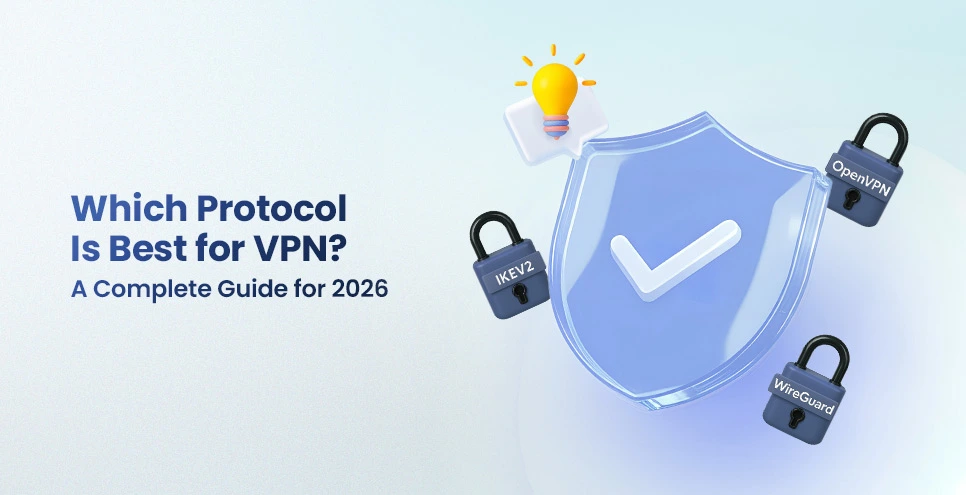
Fast, private, and reliable connections are now essential for work, streaming, and secure data access. The VPN protocol you choose directly affects speed, encryption strength, and compatibility across devices. A poor choice can slow your network or leave data exposed.
With the VPN market projected to reach $151.92 billion by 2030, users are demanding options backed by real performance and security results. This guide compares the leading VPN protocols of 2026, focusing on performance, encryption strength, and real-world usability.
By the end, you’ll know exactly which protocol is best for VPN that fits your needs, whether for personal use or business operations.
A VPN protocol is a set of rules that defines how your data travels securely from your device to the internet. Think of it as a tunnel: some are wide and fast, while others are fortified with strong encryption. Protocols determine connection speed, security, and device compatibility.
Need a custom-built solution? Explore Kolpolok Limited’s VPN development service to see how experts design secure, high-performance VPNs.
The design of a protocol affects CPU usage, reconnect behavior, and handling of packet loss. Cipher sets and code size influence audits and long-term trust. Real-world performance depends on your device, server location, and internet path.
Selecting the right VPN protocol impacts three key areas:
As cyber threats grow and devices multiply in 2026, selecting the right VPN protocol has never been more important.
Now that we understand why VPN protocols matter, let’s explore the leading options in 2026. Each protocol offers a unique balance of speed, security, and compatibility. Some are perfect for personal use, while others shine in business environments. By comparing their features, strengths, and limitations, you can identify the best fit for your specific needs.
Open-source, widely trusted, supports strong encryption (AES-256). Runs on almost all platforms and networks.
Pros:
Cons:
Ideal Use: Secure personal VPNs, enterprise networks, mixed OS environments
Quick Tip: Use UDP mode for performance; TCP mode helps bypass strict firewalls.
Modern, lightweight protocol designed for speed and simplicity. Uses modern cryptography and a compact codebase, reducing bugs and overhead.
Pros:
Cons:
Ideal Use: Streaming, gaming, high-performance remote work, modern enterprise setups
Quick Tip: Works best on UDP-friendly networks; lightweight design improves throughput and reduces CPU load.
Schedule a consultation with our experts to implement the right VPN protocol for your needs.
Secure protocol with fast reconnection, especially suited for mobile devices. MOBIKE support allows seamless roaming between networks.
Pros:
Cons:
Ideal Use: Mobile users, remote teams, LTE-to-Wi-Fi switching
Quick Tip: Perfect for always-on mobile VPNs; combines stability with strong security.
Legacy protocol paired with IPSec for encryption. Supported on older devices but less common today.
Pros:
Cons:
Ideal Use: Legacy environments or backup VPN connections
Quick Tip: Avoid deploying L2TP/IPSec for new setups; use only for compatibility with older systems.
Very old protocol with weak security. Modern experts and Microsoft discourage its use.
Pros:
Cons:
Ideal Use: Rare legacy use only
Quick Tip: Avoid for personal or business use; consider modern alternatives like WireGuard or OpenVPN.
| Protocol | Speed | Security | Device Support | Best Use |
| WireGuard | Very High | Modern Ciphers | Windows, Mac, Linux, iOS, Android | Streaming, gaming, remote work |
| OpenVPN | High | AES-256 | Windows, Mac, Linux, iOS, Android | Secure personal/business VPNs |
| IKEv2/IPSec | Medium | Strong | Mobile-focused, Windows, Mac | Mobile users, remote teams |
| L2TP/IPSec | Low | Medium | Legacy devices | Old systems, stopgap connections |
| PPTP | High | Weak | Legacy devices | Avoid for sensitive data |
WireGuard consistently delivers the fastest connections, often outperforming OpenVPN by up to 60% in real-world tests. Its lightweight design reduces overhead, making it ideal for streaming, gaming, and transferring large files.
Test speeds on different servers to see which protocol performs best for your location and devices.
OpenVPN and IKEv2/IPSec offer the strongest encryption standards in 2026. Both protect against leaks, man-in-the-middle attacks, and ensure compliance for business use. However, WireGuard provides strong security with modern cryptography while maintaining high performance.
Security Quick Tips:
Choosing the right VPN protocol in 2026 balances speed, security, and device compatibility.
Kolpolok’s VPN development solutions simplify protocol selection and deployment, ensuring fast, secure, and reliable connections for personal or business use.
Kolpolok Limited builds modern VPN stacks for real-world fleets. You get help with protocol selection, rollout plans, and performance baselines. Our team supports SDK and API based integration for mobile and desktop. White-label options speed up launch and give you brand control. See our VPN development service to plan a secure, high-performance rollout for Canada, the US, the UK, Australia, and beyond.
WireGuard delivers the fastest connections, especially for streaming and large file transfers.
OpenVPN and IKEv2/IPSec provide robust encryption and compliance suitability.
Yes, most VPN apps allow switching protocols based on speed, security, or device compatibility.
WireGuard is faster and simpler; OpenVPN has a longer track record and slightly broader server support.
Most VPN apps include protocol settings in their preferences or settings menu; select the protocol and reconnect.
For details information about switching VPN protocols, you can explore this blog: https://kolpolok.com/switch-vpn-protocol-speed-security/
No for new builds. Both face deprecation or weak security. Plan a migration path.
Ultimately, knowing which protocol is best for VPN helps you balance speed, security, and device compatibility. WireGuard, OpenVPN, and IKEv2/IPSec each shine in different scenarios, while L2TP/IPSec and PPTP are mostly legacy choices.
Talk to us for fast, secure VPN development — complete with SDKs, APIs, and white-label options.
Start your project today and stay ahead in the growing VPN market.